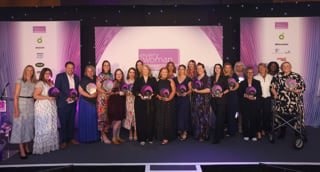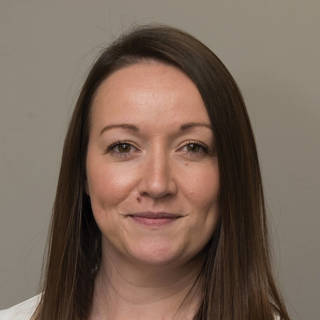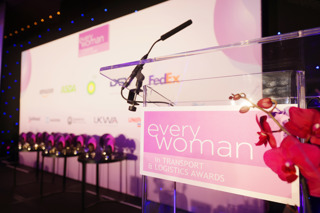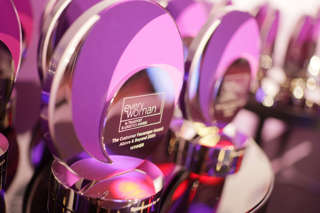Women should end up in the transport industry by choice rather than by accident, according to Maxine Benson, co-founder of Everywoman, a membership organisation that seeks to advance women in business.
“Over the years when we’ve polled women at our Transport & Logistics Leadership Academy, there has been a large percentage of them who say they have fallen into the industry,” says Benson.
“It wasn’t that they had any desire to do it – they just fell into it. And once they get in there, they thrive. We want to showcase it, so it stops being an accident that great talent ends up in the industry, so that it’s a choice.”
Everywoman, which Benson set up in 1999 with Karen Gill, offers online resources, training and networking for women working in a range of sectors. It currently has 18,000 members in 90 countries. It holds an annual awards ceremony in partnership with the Freight Transport Association (FTA) to raise awareness of the careers that the sector offers and aims to increase the number of women who pursue them.
This year’s ceremony – at the Hilton Park Lane, London, in May – saw winners from a range of organisations, including TNT Express, Transport for London (TfL) and Shell (see the winners’ panel opposite).
“The awards are about uncovering role models that will inspire others and create ambassadors for the industry,” says Benson.
Winning an award is often “the nudge” that women need to “step into that ambassadorial role”, she adds.
Of the 22 finalists, this year’s woman of the year, Caroline Rose, head of regional operations at TNT Express, has arguably the biggest ambassadorial role to play.
Rose has been in the logistics industry for almost 30 years and secured her first depot manager’s role at 26. She now heads TNT’s 11 depot operations across London and the South East.
“It’s the type of industry that is Marmite: you either love it or you hate it, and I absolutely love the day-to- day challenge,” she says.
“The logistics industry requires you to work long hours at times, and that’s hard to balance with family life. But that’s not gender-specific; it’s a hard balance for anyone. It doesn’t stop, it rolls day and night.”
Rose believes people often look at the transport industry and “only ever see trucks”, not the roles that sit behind them.
“We need to do more as an industry in terms of that attraction,
making people understand what sits behind the logistics,” she says.
“You can work anywhere in the UK, but you can also have opportunities that take you around the world.”
The industry also needs to raise awareness among women considering a career change that many transferable skills apply to the transport sector, according to Jerry Ward, manager legal operations, central transport at John Lewis Partnership. Ward joined the judging panel of the FTA Everywoman in Transport and Logistics Awards this year. The John Lewis Partnership encourages women to work within its transport, fleet and supply chain areas, and female staff have transferred into those areas from other parts of the business.
Getting the message across to schools and colleges also has a part to play in getting more women into the industry.
Ward says: “It is important that the transport industry and fleet sector continues to encourage more women into this very interesting and challenging industry by starting at grass-roots level – talking to schools and colleges and explaining the numerous and varied transport, fleet and supply chain roles available and the great career paths these can lead to.”
Everywoman’s latest initiative, Modern Muse, a not-for-profit social enterprise, aims to inform and inspire students aged eight and upwards about future career paths.
“Modern Muse is a great way to reach out to girls in schools really early on,” says Benson.
“They need to see what careers look like in this industry while they are still young and open to ideas.”
TfL is working with schools to inspire more women and young people to work in transport through its Women in Transport programme (formerly 100 Years of Women in Transport), which will see 12,500 volunteers visit schools, provide work experience and present at careers fairs.
A new schools toolkit aimed at 11- to 16-year-olds has also been launched, which includes two short films on the role the transport industry has in society, and a suite of online supporting materials showcasing the wide variety of roles available within the industry.
Jo Field, head of campaigns, communications and engagement at TfL, who won the industry champion of the year award, says: “Reaching young people, particularly young women, is hugely important.”
Field is a board member of the Women’s Transportation Seminar (WTS) London group, a professional network for women in transport, which has about 1,000 contacts.
WTS London is acting as the secretariat to the new All-Party Parliamentary Group for Women in Transport, which was set up in May. Field believes the group could have a big impact.
“Once you’ve got parliamentary support and it starts to move up the agenda, it could make a real difference,” she says.
The launch event is due to take place this month, followed by a number of themed events, looking at how to break down stereotypes, give positive role models and encourage STEM (science, technology, engineering and maths) subjects, as well as how to arm women with the skills they need to advance their careers in transport.
Field believes women in transport that want to get into senior management roles need to work on “personal branding”. “Sometimes women have a tendency not to champion their achievements, so it’s not enough to simply do a good job, you need to tell people about the good work that you’ve been doing,” she says.
Rose thinks progress is being made: “When I joined the industry in my 20s, I was one of two depot managers. There are far more women in senior leadership roles. Traditionally, they would have been found in sales or customer service, but now I find far more women in operations. For the first time, we’ve got a female managing director, which is fantastic.”
The number and type of organisations entering the FTA Everywoman in Transport and Logistics Awards is increasing every year. Benson says: “That is indicative of more companies recognising the importance of shining the spotlight on their female talent.”




















Login to comment
Comments
No comments have been made yet.